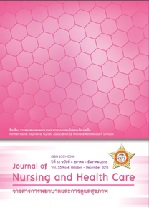ปัจจัยทำนายอาการอ่อนล้าหลังผ่าตัดในผู้ป่วยที่ได้รับการผ่าตัดช่องท้อง Factors Influencing Postoperative Fatigue Among Patients Undergoing Major Abdominal Surgery In Dak Lak, Vietnam
คำสำคัญ:
ผู้ป่วยที่ได้รับการผ่าตัดช่องท้อง อาการอ่อนล้าหลังผ่าตัด ความแปรปรวนของการนอนหลับ ภาวะ โภชนาการอาการปวดหลังผ่าตัด postoperative fatigue, preoperative anxiety, sleeps disturbance, nutrition status, postoperative pain, patients undergoing abdominal surgery.บทคัดย่อ
การศึกษานี้เป็นการวิจัยเชิงพรรณาเพื่อศึกษาความสัมพันธ์เชิงทำนายระหว่างความวิตกกังวลก่อนการผ่าตัด
ความแปรปรวนของการนอนหลับ ภาวะโภชนาการ และอาการปวดหลังผ่าตัด กับอาการอ่อนล้าหลังผ่าตัดของ
ผู้ป่วยที่ได้รับการผ่าตัดช่องท้องในโรงพยาบาล Dak Lak ประเทศเวียดนาม โดยใช้แนวคิดทฤษฎีอาการไม่พึง
ประสงค์เป็นกรอบแนวคิดในการศึกษา กลุ่มตัวอย่างเป็นผู้ป่วยที่ได้รับการผ่าตัดช่องท้อง จำนวน 90 ราย โดยใช้
การสุม่ อยา่ งงา่ ย เครื่องมือที่ใชใ้ นการวิจัย ประกอบดว้ ย 6 ชุด เก็บรวบรวมขอ้ มูลระหวา่ งเดือนกรกฏาคมถึงสิงหาคม
พ.ศ.2558 วิเคราะห์ข้อมูลด้วยสถิติเชิงพรรณนา และการวิเคราะห์ถดถอยพหุคูณ ผลการศึกษาพบว่า ผู้ป่วยที่ได้
รับการผ่าตัดช่องท้องมีอาการอ่อนล้าหลังผ่าตัดอยู่ในระดับสูง (M= 95.94, SD= 14.72) ความวิตกกังวลก่อนผ่าตัด
ความแปรปรวนของการนอนหลับ ภาวะโภชนาการ และอาการปวดหลังผ่าตัด มีความสัมพันธ์กับอาการอ่อนล้าหลัง
ผ่าตัด และสามารถร่วมทำนายอาการอ่อนล้าหลังผ่าตัดได้ร้อยละ 52.4 (p < .001) โดยปัจจัยทำนายอาการอ่อนล้า
หลังผ่าตัดที่ดีที่สุดคือ อาการปวดหลังผ่าตัด (β= .35, p< .001) ผลการศึกษาเสนอแนะว่า พยาบาลควรประเมิน
และวางแผนจัดการอาการวิตกกังวลก่อนผ่าตัด ความแปรปรวนของการนอนหลับ ภาวะโภชนาการ และอาการปวด
หลังผ่าตัด เพื่อป้องกันอาการอ่อนล้าหลังผ่าตัดในผู้ป่วยที่ได้รับการผ่าตัดช่องท้อง
This study exam ine the relative influence of postoperative fatigue and preoperative anxiety, sleep disturbance, nutrition status, and postoperative pain among patients undergoing abdominal surgery in Dak Lak General Hospital, Vietnam. The Theory of Unpleasant Symptoms provided a conceptual framework for this study. Ninety patients were recruited by simple random sampling between July and September 2015. Data were collected via six instruments. Data were analyzed via descriptive statistics and standard
multiple regression. The mean postoperative fatigue score for abdominal surgery patients was 95.94 (range = 25-150, SD = 14.72). Standard multiple regression analysis indicated that preoperative anxiety, sleep disturbance, nutrition status, and postoperative pain were significantly related to postoperative fatigue and explained 52.4% of the postoperative fatigue variance (p < .001). The strongest predictor of postoperative fatigue was postoperative pain (β = .35, p < .001). The findings suggest postoperative fatigue in
abdominal surgical patients can be reduced by controlling preoperative anxiety, sleep disturbance, nutrition status and postoperative pain. Nurses are logical health care professionals to develop and administer such preventions and interventions.



